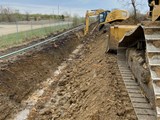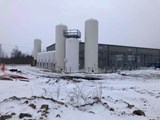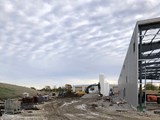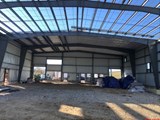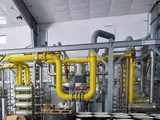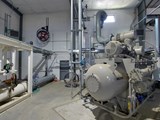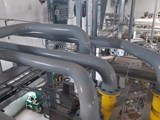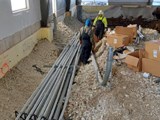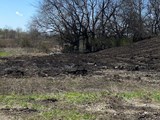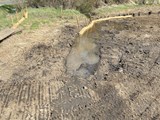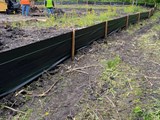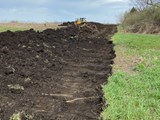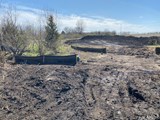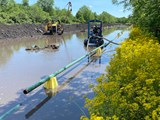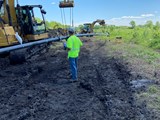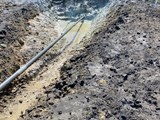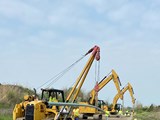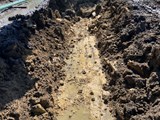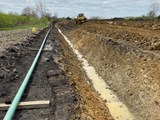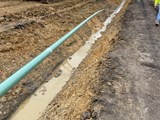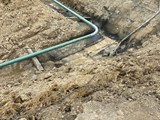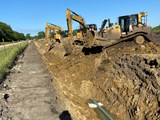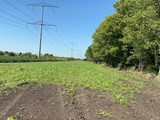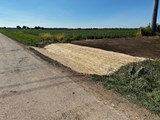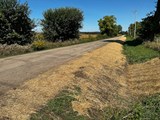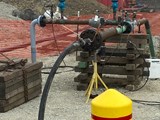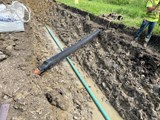Will County Renewable Natural Gas (RNG) Project
WILL COUNTY, ILLINOIS
RENEWABLE NATURAL GAS PROJECT
This case study describes the process by which a gas processing plant and pipeline came into existence for the purpose of transporting methane from a landfill to an interconnect and custody transfer point to a natural gas transmission pipeline.
Background
In 2019 a Will County staff member met a representative of Eco Engineers. This firm specializes in renewable energy consulting and development. At that time Will County’s Prairieview Landfill was using a Gas to Electric (GTE) plant to burn landfill gas and generate electricity that was then fed into the power grid. This system could not use all the gas generated, resulting in raw landfill gas flared off.
Eco Engineers discussed the concept of Renewable Natural Gas (RNG) processing. RNG offered the possibility of using 100% of the gas generated by the landfill. Thereby increasing revenues to the County. The facilities to process and transport the RNG were more complex and costly, but the life of the facilities and benefits was much greater.
They also performed a cost benefit analysis which showed that the revenues generated from RNG far exceeded the GTE system. Furthermore, the RNG system functions for the life of the landfill and continues for another 25 years after the landfill reaches capacity but is still producing gas.
Landfill gas is 45-60% methane, 45-60% carbon dioxide, 2-5% nitrogen and 1-2%of oxygen and other gasses. Methane is about 30% more potent as a greenhouse gas compared to carbon dioxide. The process of purifying landfill gas to methane involves the use of different types of gas separation, including membrane particulate filtration, pressure swing adsorption and the removal of condensate, this effectively purifies the gas stream into natural gas. The combustion byproducts of natural gas are water and carbon dioxide. This lessens the impact on the environment, while also supplying a renewable fuel.
The engineering analysis performed by Eco Engineers proved that Will County would benefit from a greater revenue stream, an approximate 40-year life for the facility, and an overall reduction of the environmental impact of the landfill during and after its useful life.
Once the County decided that the RNG project was practical, understood how much gas could be produced and who would buy the gas, the project idea was presented to the Will County Board for approval.
After approval, In the fall of 2019, Will County issued a request for proposal (RFP) for the engineering, procurement, and construction (EPC) of the RNG plant. Upon publishing the RFP, seven bidders responded. In consultation with Eco Engineers, the County explored and researched the bids thoroughly to decide which contractor would best serve the County’s vision and goals. They selected SCS Engineers to design and build the RNG processing plant.
Shortly after this choice was made another RFP was developed with the help of Eco Engineers for the design and construction of the pipeline, associated valves and interconnect point. The winning submission was from Midwestern Contractors. Their proposal described a plan, along with costs, for each phase of the project.
Will County and Eco-Engineers expected the winning bidder to manage the entire project. Right of way, permits, construction and final operation were included in the project. The Will County project team included:
Project team
- Eco Engineers Engineering consultants to Will County, and feasibility analysis.
- SCS Engineers RNG Plant design/build
- Midwestern Contractors - General Contractor for pipeline design/build
- EN Engineering – Pipeline design and engineering
- Midwestern Contractors - DOT, RR and County permits
- Midwestern Contractors - Pipeline construction, directional drilling, pressure testing, welding, Non-destructive testing, environmental controls, surface restoration
- Will County - Oversight and coordination of contractors
Description:
The RNG processing plant project included equipment for cleaning and conditioning the gas. Pump systems can place a slight negative pressure on various cells in the landfill to induce gas flow more effectively. Compressors pressurize the clean gas for injection through the meter and regulation system and then into the pipeline
The pipeline project included the acquisition of right-of-way (ROW). Securing all relevant permits for environmental disturbance and remediation, temporary access and workspace, permanent ROW easements and crossing permits for directional drilling under roads, highways, and railroad. The Will County RNG pipeline is 4” diameter carbon steel, with an approximate length of 36,900’. Open cut and directional drilling methods were used to install the pipeline. The pipe welds were 100% X-rayed and the pipeline was hydrostatically pressure tested. The design includes launcher and receiver flange connections for future pipeline inspections. The pipeline originates in the vicinity of Latitude 41.343045º, Longitude -88.099311º. After completion and commissioning Will County contractors will operate the pipeline in full compliance with PHMSA and US DOT standards. Will County will own the entire pipeline and gas processing plant.
Design & Build:
SCS Engineers won the contract to design and build the gas processing plant. They performed all design engineering and procurement (EPC) of materials and equipment. Harbor Contractors performed as a subcontractor and provided all site preparation, civil work, building construction, mechanical, electrical and control wiring.
Biological processes produce gas which then flows into the gas processing plant. Raw gas processing occurs by removing moisture through dehydration, then filtering particulates, removing hydrogen sulfide, and removing volatile organic compounds (VOC’s) and CO₂ by using pressure swing adsorption (PSA) systems.
The resulting gas will be pure methane, or natural gas. The plant will then compress this gas to approximately 900 psi and inject it into the pipeline.
Midwestern Contractors (MWC) was responsible for the pipeline right-of-way (ROW) acquisition, environmental analysis, cultural surveys, geo-technical work, and construction, crossing permits for drilling and open cut work. MWC performed ROW clearing, excavation, environmental protection, pipeline construction, directional drilling, and surface restoration, and finally the hand-off for initial startup and long-term operation.
ENTrust Solutions completed the design drawings for the pipeline and control valves. The original proposed pipeline route was reviewed, and it was determined that the existing pipeline corridor was too crowded to allow for another pipeline to be installed. Alternative routes were evaluated based on construction feasibility, environmental surveys, cultural and archaeological surveys, as well as landowner receptiveness to the project. After accounting for all these factors, a clear path was negotiated and mapped.
The environmental surveys did reveal delineated wetlands and waterbodies. These areas were protected from construction activities by using erosion control devices and by following the project specific Stormwater Pollution Prevention Plan. Silt fence and filter socks were employed to protect against siltation from spoil runoff. Truck mats allowed equipment to pass without soil damage. Directional drilling (HDD) bored, reamed, and pulled the pipe under sensitive wetland and waterbody areas without ground disturbance.
The cultural and archeological surveys revealed no significant findings.
Midwestern Contractors permit department and ENTRUST Solutions Group (Formerly EN Engineering) divided the task of acquiring permits for road crossings, directional drill, and ROW access.
While the preliminary routing and investigations were accomplished, the engineering team at ENTRUST Solutions Group worked on the overall piping design, and associated facilities. The 4” line starts with a flange connection to the gas processing plant at the landfill, with an additional flange for a temporary launcher barrel connection. The interconnect point at the end of the pipeline has a flanged connection for a temporary receiver barrel and a flange to the gas operator’s facilities after which point the gas is no longer in the custody of Will County. A segment of the pipeline lies under AC transmission lines. ENTRUST Solutions Group evaluated the AC mitigation that required to protect the pipeline from induced current flow from the overhead transmission lines. They also designed the anode bed at the midpoint of the project.
Construction began when the final drawings were issued for construction, and all permits were secured. Excavation and drill crews worked simultaneously to install sections of the pipeline. Drill pipe strings were hydrostatically tested above ground, pulled into place, tied-in and then tested again with the entire line. DOT specifications for pipeline depth were adhered to. Open cut road crossings were backfilled and compacted to DOT standards.
During directional drilling, silt fencing surrounded the entry and exit pits to prevent runoff. Recirculation systems managed the drilling mud. This reduced the overall quantity of mud required and allowed for the use of roll-off boxes for mud storage. Our geotechnical work revealed layers of bedrock on two of the drills. Running sand encountered on several drills, caused some difficulty in holding the bore hole open.
Hydrostatic test water, from local municipal wells, filled frac tanks. After use, it pumped back into the tanks for disposal.
Weld inspection technicians conducted nondestructive tests using X-rays. DENSO 7200 coating, applied by brush, formed a tough abrasion resistant and waterproof coating over the pipe.
Backfilling, compaction, hard and soft surface restoration completed the project.
Challenges:
There were many challenges, but Will County was adept at keeping the big picture in mind and was able to turn these challenges into opportunities. Coordination of multiple contractors and other entities turned the Will County staff into Project Managers overnight. The County staff had to work through lengthy contract negotiations and scheduling delays. One change precipitated others resulting in a domino effect. The biggest challenge was the acquisition of right-of-way. This project was a “green” project. But that did not make it easy to acquire the right to lay a pipeline across federal or state land. Numerous pipeline routes were explored, and, in the end, a much longer route was secured that carried out the goal of delivering biogas to consumers.
Other challenges included encountering bedrock and running sand, during directional drilling, and unexpected environmental conditions that caused construction delays.
From the first conversation in spring of 2019 with Eco Engineers; through project feasibility, landfill gas rights attainment, landfill agreements, contractor selection and approval; pipeline re-routes and easement acquisition; to gas purchase agreement and full operation, the entire process took three and a half years. Commissioning is expected to be completed at the end of November 2022.
Results:
This landfill will produce methane gas for an estimated 40 years. The gas processing plant can handle flow rates up to 4,500 scfm (Standard Cubic Feet per Minute), with expansion of up to 6,900 scfm. This resource would otherwise have been vented to the atmosphere. Because of Will County’s vision and action 100% of the methane will be processed and used as fuel to heat homes and businesses.
About Will County
Will County is in the northern part of Illinois and is one of the fastest growing counties in the United States. The county seat of Will County is Joliet. Founded in 1836, today Will County is a major hub for roads, rail, and natural gas pipelines.
About Eco Engineers
We are engineers, scientists, compliance auditors, regulatory consultants, carbon analysts, market researchers, and trusted advisors of the clean energy fuels sector. We live and work in the intersection of low-carbon fuel policy, innovative technology, and the carbon marketplace.
Our practice areas include major carbon markets such as the USEPA’s Renewable Fuel Standard (RFS), California’s Low Carbon Fuel Standard (LCFS) and Cap-and-Trade (MRR), Oregon’s Clean Fuel Program (CFP), Brazil’s RenovaBio, and more. We have deep expertise in all commercially available low-carbon fuels and technologies.
About Midwestern Contractors
Midwestern Contractors is a pipeline and station contractor and has managed, executed, and delivered quality projects to the oil and gas industry since 1951. Over that 71-year history our projects have varied from pipelines, pipeline maintenance, complete turnkey station builds involving civil, environmental, mechanical, electrical, and complete commissioning and restoration. Our customers include BP, TC Energy, Enbridge, Vector, Alliant, ComEd, AMEREN, NiSource, NIPSCO, Buckeye, CITGO, Shell, OneOK, Explorer, Marathon, Wolverine, Peoples Gas, Linde and others. Through the years we have maintained a competent, operator qualified workforce. An outstanding safety record and quality assurance program. We are driven to improve in every aspect of our business. Our people are committed professionals who value our customers and take pride in delivering quality projects on time.
About ENTRUST Solutions Group (Formerly EN Engineering)
ENTRUST is an industry leader dedicated to excellence, safety, quality, and reliability. We serve several markets, including power, gas utilities, gas transmission and midstream, industrial, and manufacturing, and telecommunications. We have also embraced growing markets such as renewables, power engineering services, EV infrastructure, data analytics, and geospatial with cutting edge engineering, consulting, and automation services.
For 20 years, businesses, people, and communities have relied on the employees of ENTRUST Solutions Group to protect their most valuable assets, infrastructure, and the projects that improve them. As one of the fastest-growing engineering firms in the country, we have grown from a single Midwest office to a national network of locations. We have a network of offices across the country and can support clients in any state as well as internationally.
We offer valuable solutions to challenges faced by our clients, restore, and expand infrastructures, enhance, and streamline systems, and identify and record key assets for clients, including gas and electric utilities, telecommunication service providers, pipeline operators, and industrial companies. Our team is experienced and up to date on federal, state, and local codes to guarantee regulatory compliance and safety of the surrounding public
Our professionals have extensive training and technical expertise in all aspects of gas pipelines, gas compression, meter/regulator facilities (interconnects and custody transfer), as well as storage and production facilities, dehydration facilities, terminal upgrades and liquid handling, and emissions control. Our services include a full spectrum of capabilities in gas transmission engineering, design/drafting, inspection, project management, procurement, and consulting.

